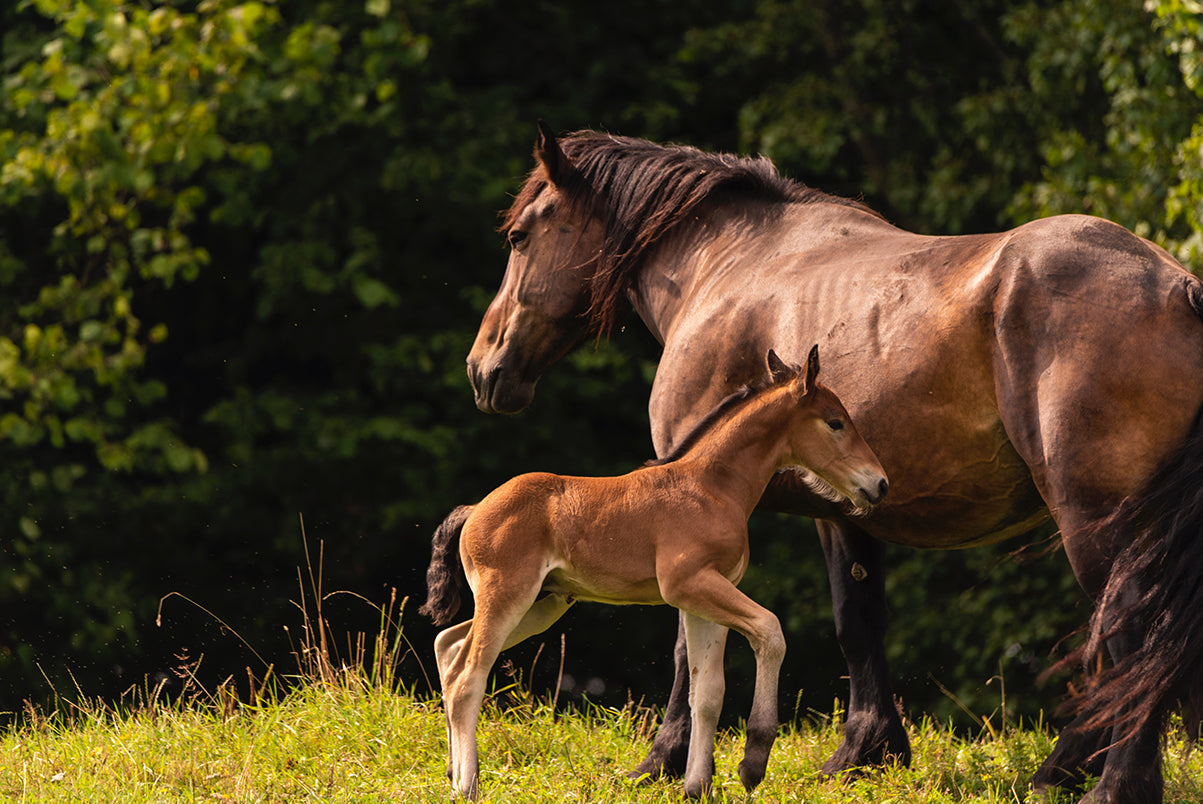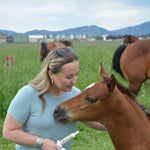Setting The Stage For Foal Health
October 21, 2025

Key Takeaways You’ll Get
- Passive transfer of antibodies from the mare to the newborn foal sets the stage for your horse's immune system to develop.
- The stresses a mare encounters, from breeding to foaling, alter her gut microbiome significantly, compromising her immunity and that which she shares with her foal.
- We can help create healthy competitive inhibition in the foal’s gut by introducing proper probiotics early in his life.
- For older foals and weanlings, we can avoid wrecking their microbiome by ensuring probiotics are administered any time they are facing stress, using antibiotics or being offered creep feeds.
Watch Dr. Rob Franklin and Dr. Keith Latson explain how to Set the Stage for Foal Health
Your lithe, leggy little foal has landed. He’s keeping you entertained, and his dam exhausted, with his curiosity and playfulness. It might seem like keeping him in one piece is your biggest challenge at this point, given that the “difficult parts” are out of the way—getting the mare in foal, keeping her healthy, and waiting for and attending to her foaling—and he’s zipping about like a drone with a freshly charged battery.
But there are other threats at hand—threats that lurk in the foal’s gut, even though theoretically that gut is fresh and new.
We know the ecosystem of microbes living in the adult horse’s hindgut (the GI tract beyond the small intestine) is crucial to good health. Imbalances can lead to anything from diarrhea and colic to allergies and behavior problems.
The foal is not exempt from this risk of imbalance, says Dr. Rob Franklin, an equine internal medicine specialist and co-founder of FullBucket, a veterinary-strength supplement business based in Weatherford, Texas.
What are the First Meal Fundamentals
The foal’s gut is a blank slate for a great future. How do we avoid wrecking it?
We tend to think of the foal’s gut in the context of colotrum—the first milk meal, whereby the foal gets passive immunity from the mare if he consumes it within his window of gastrointestinal absorption, which begins closing at 12 hours and is done by 18 or even 24 hours.
“They’re not ready to tackle any invasion by a disease-causing bacteria or virus on Day 1,” says Franklin. “If there’s a delay in ingesting colostrum, if there is a problem with the quality of it, or if it is leaked by the mare, that foal is going to get a severe infection. That’s why we do these passive transfer tests called an IgG at 18 to 24 hours to make sure they’ve ingested it.”
But even more is going on in that gut beyond—and after—colostrum absorption. “That foal is born with a naive immune system, it’s born with a blank slate in its digestive tract … the microbiome is anxious to develop,” says Franklin. “It’s critical that it develops in a proper way that protects that foal from disease.”
How to avoid wrecking the developing newborn immune system and gut? Hint...careful with the creep feed.
Mama Needs a Break (So Do Her Gut Microbes)
Whether the colostrum equips the foal to mount proper immune responses to pathogens (disease-causing organisms) and curate a balanced and effective gut microbe ecosystem depends on factors as far back as his dam’s breeding season: Caretakers changed her feed to be ready for the demands of carrying a foal, they kept her in the barn under lights to get her estrous cycle going after the winter period when it stops, and if she left the farm to be bred, she experienced inevitable stress from shipping.
In short, the mare’s hindgut microbes had a million reasons to change remarkably even before breeding and yet, because she’s a superstar, she conceived and carried that baby despite the shifts.
Then the dam’s microbiome took another hit around the time of foaling. Franklin explains that studies show broodmares are more at risk for colicking in the peripartum period, the time around when they’re getting ready to foal. Here’s why: “They start bringing the mare (who) … used to be out, now she’s in,” he says. “Now her social setting has changed, now her diet has changed. All these changes are disrupting the microbes in the gut.”
In this state, her immune system is depressed and, so, she isn’t equipped to help her foal get off on the right foot. “Typically the foals that get the sickest, become sick in the first week of life because they don’t have the competitive inhibition that a populated digestive tract has,” something the foal can build with good, strong early immunity.
Those sick foals? They’re at a disadvantage because of not only the state of their gut but also what veterinarians must do next to treat them.
Dr. Keith Latson, an equine surgeon, co-founder and director of operations of FullBucket, says, “Now we’ve taken a very immature, developing microbiome, and baby immune system, and we’ve unfortunately had to give antibiotics: indiscriminate microbe killers.”

Robust Milk Drinker to Sick Foal Creep Feeder
But even new foals that aren’t overtly sick can have early gut issues. “One of the really interesting things to me is the inability of some foals to digest the sugars in mares’ milk, and how that may contribute to dysbiosis or a shift in that very immature microbiome,” says Latson, a concept he believes is key to new foal care.
“Initially it’s just milk that’s passing through,” explains Franklin, “so they’re going to have bacteria that can tolerate the pH that the milk is digested in. That’s going to create a friendly layer of competitive inhibition against a pathogen, and they’re not going to get much disease.”
But any hiccup in the foal’s life, any stress or disruption, can cause these bacteria to become outnumbered in a hurry in that naive-gut environment. “One of the main ideas of giving probiotics to a young newborn foal, is to try to set up a GI tract that does have competitive inhibition,” says Franklin. “You can put lots of friendly microbes in, allow the good gut bugs to expand and keep the bad bacteria out.”
As a healthy foal’s gut matures, his hindgut comes alive and he starts to be able to digest cellulose, which is the fibrous part of plants. At 4 months old, about the time of weaning, things can go awry again with traditional husbandry practices.
“You see them eating with their mom,” says Franklin. “They’re watching mom and eating what she’s eating, and then we start to give them grain creep feed. ‘You’ve got to give them some creep feed, they need some energy,’ (we say). How do you think these foals in the wild are getting their energy? What are we trying to do? We’re trying to push their system.”
So, as owners with good intentions feed and even bulk up their weanlings, getting them slick and ready for sale, they spin the horses’ microbiomes on their head with the sugars in creep feed—this on top of the stress associated with separation from mom and getting acclimated to a new turnout or stabling situation. “Stress has a real physiological effect on us and on our physiology,” says Franklin.

How to Help: Best Immune Boosters for Horses
Thankfully, you can prepare your little newborn foal for that stress and set them up for a life with a great gut microbiome.
Speak with your veterinarian about setting your foal up for success with antibodies and probiotic support on days 1-7 of life. FullBucket has created the best foal supplements for immune support in the early days and stages of development.
It’s Never Too Early to Have your Horse’s Gut Health in Mind
Foal Kick Start Paste - A paste to use on the first day of life with highly concentrated Egg Immunoglobulins to help support the foal's GI system and provide it the best opportunity to have a healthy start to life.
Foal Probiotic Paste - The FullBucket Foal Probiotic is the very first of its kind: one product with multiple solutions. It contains two probiotic strains, a prebiotic, egg immunoglobulins, digestive enzymes and L-Glutamine.
Foal Starter Kit - The Foal Kit was put together for owners of mares and breeding operations that need to get a head start on GI Disease outbreaks BEFORE they start. It’s a 7-Day prevention plan in a box. The Foal Starter Kit contains one tube of Foal Kick Start for day 1, six tubes of Foal Probiotic for days 2-7, and one set of Foaling Indicator Strips and Foal Information Cards.
“We don’t have to wait for them to get sick before we can go in there and set up an intervention to protect them along the way,” says Franklin. “Part of that is the way we feed and manage them.
“The more they can be out, the more they can get sun on their back, eating grass, the better,” he adds. “They can get all they need from forage and living beside their mom, they don’t have to get these massive grain meals. If you do feed those grain meals, you better be doing something to counteract their negative effects, because there are negative effects.”
Keeping the Weanlings, Yearlings and Mares Healthy with FullBucket
From the stress brought on by weaning, through the stages of growing into a yearling, FullBucket is here to protect young horses through the many phases of development.
However, don't forget about the mare; She has her feed changed to carry a foal, she likely has been housed at a breeding farm or has been hauled back and forth, and her schedule has changed multiple times through the foaling and weaning process. All of these situations can take a hit on the broodmare’s hindgut microbiome.

FullBucket can help protect the mare with equine probiotic pellets, granules and paste.
FullBucket is the only equine supplement company totally focused on digestive health. Our complete line of all-natural digestive products helps support the equine immune system and prevents GI distress that commonly leads to severe problems such as colic, colitis, and ulcers.

